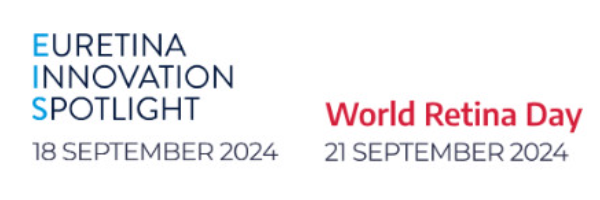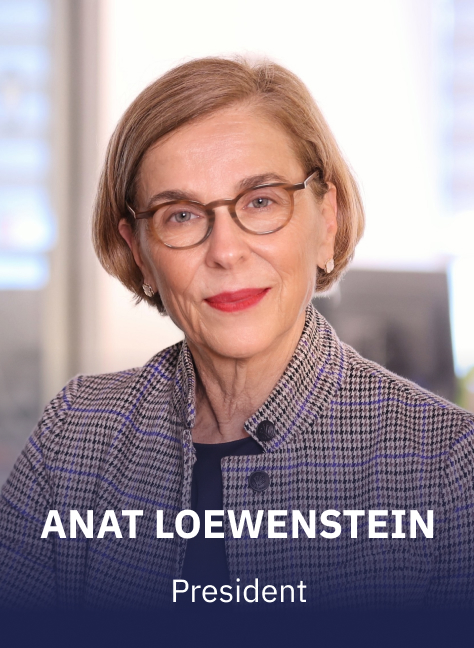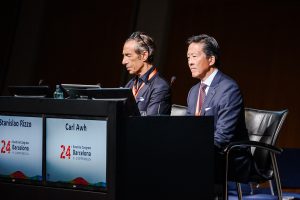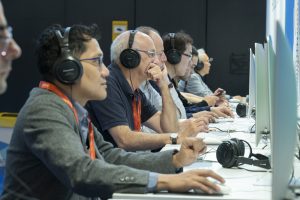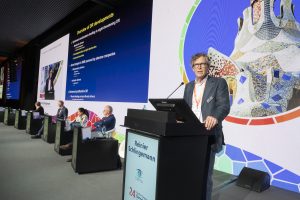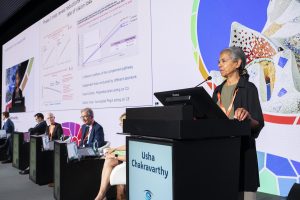At the General Assembly meeting at the 23rd EURETINA Congress in October, 2023, Prof Anat Loewenstein, MD, MHA (Israel) was elected as President-Elect of the society by unanimous decision of the EURETINA Board. In the spring of this year, she took on the position of president early, following the sudden tragic passing of Prof Ramin Tadayoni.
Paying tribute to Prof Tadayoni, Prof Loewenstein described him as an amazing retina physician, researcher, leader, and friend. She said that going forward, she and other EURETINA leaders will be working to carry on Prof Tadayoni’s strong legacy for advancing retina research, education, and clinical care.
Against that background, Prof Loewenstein discusses the status of EURETINA, the society’s initiatives, and its challenges.
To what do you attribute the continued growth of EURETINA and the annual meeting?
Prof Loewenstein: The huge developments that have occurred in the field of retina and retina research in recent years is a major factor. I can say without doubt that within ophthalmology and even perhaps within the whole field of medicine, retina is the area where we are seeing the most advances. The many innovations include options for previously untreatable diseases, such as age-related macular degeneration. In addition, there have been advances in medical therapy that include treatments with novel mechanisms of action and longer durability as well as focusing on safety and improved modes of delivery. We have also seen developments in surgery, including robotic techniques, and in diagnostic tools, pertaining to both imaging techniques and artificial intelligence-based methods.
These developments create a lot of interest, enthusiasm, and excitement among retina specialists, but at the same time that they are wanting to stay abreast of the cutting edge developments in our field, retina specialists in Europe and all over the world are committed to provide optimal patient care by basing their management decisions on evidence-based medicine.
I think that all of these factors are working together as forces driving the growth of EURETINA and our annual meeting. In addition, our society and the EURETINA meeting are benefiting from collaboration with industry. We are very happy to be partnering with industry to achieve a shared goal of bringing the best treatments to our patients.
What are your priorities for your term of office as President of EURETINA?
Prof Loewenstein: One of my priorities is to promote EURETINA as a society and not only for the annual meeting because we think that EURETINA has a much more comprehensive role in educating retina specialists as well as in collaborating with industry, mentoring young retina specialists, assuring diversity within our field, and fostering sustainability. My work as president of EURETINA will focus on all of these areas.
Speaking in greater detail, I am aiming to provide guidance for developing or revising major practice guideline/consensus documents, making sure that they address important issues that remain controversial and that the opinions of all groups are equally represented. In addition, I will be focusing on increasing diversity among section group heads and members, and to create an environment where retina specialists from Europe and around the world can learn and express themselves comfortably.
What are the key challenges that lie ahead for EURETINA in the next few years?
Prof Loewenstein: New treatments are rapidly emerging, but we need to be studying them further to determine their efficacy and safety in the real-world so that we can prioritise their use and make sure we are choosing the right treatments for our patients.
Rising health care costs is another issue that is creating challenges in all fields of medicine around the world, and it is something that needs to be factored into guideline recommendations.
Increasing diversity is another challenge within our organisation. We have made progress, but our work needs to continue. For example, in planning this year’s EURETINA meeting we tried to have women account for at least 30% to 40% of invited speakers, but that was not easy to achieve.
What is EURETINA doing to support innovative research in the field of retina?
Prof Loewenstein: EURETINA has a research committee, and awarding grants is part of its function. We recently provided a large monetary grant to a group investigating the very problematic issue of the treatment of macular haemorrhage. Currently, the committee is reviewing a grant application for a project focusing on facilitating communication between retina specialists worldwide by establishing uniform definitions. In addition, EURETINA recently awarded funding to support other smaller research projects as well as fellowship grants, and observership grants that allow retina specialists from all over world to meet, communicate, and collaborate with leaders in our field.
